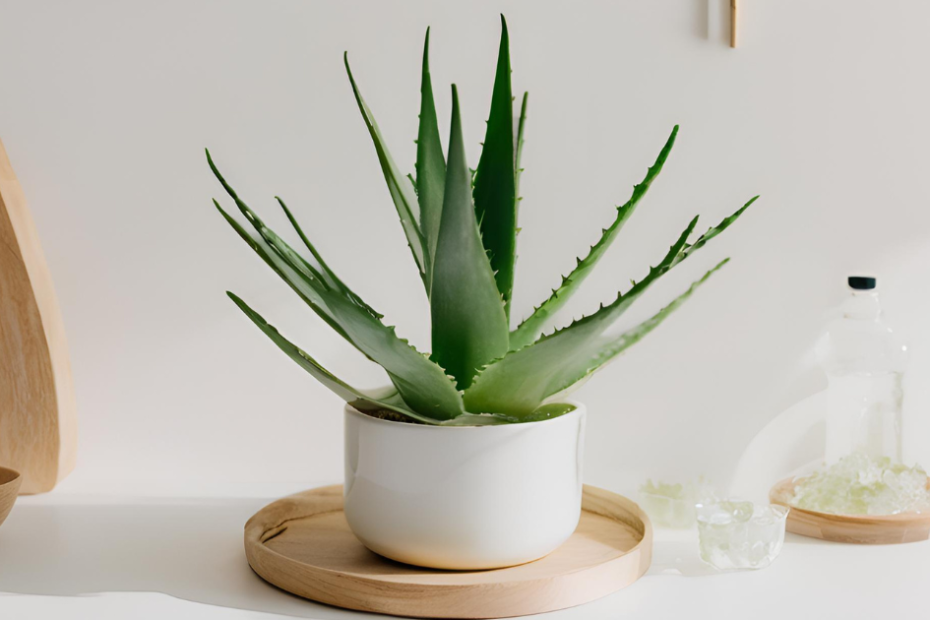Aloe vera isn’t just a trendy houseplant—it’s a living first-aid kit. According to a 2023 NIH review, aloe gel accelerates wound healing by 30% compared to conventional treatments. Whether you’re in sunny Arizona or a chilly New York apartment, this guide will teach you how to cultivate this “plant of immortality” and harness its 75+ active compounds for health, beauty, and beyond.
Why Grow Aloe Vera?
Science-Backed Benefits
- Skin Savior:
- Heals burns, sunburns, and cuts (Journal of Ethnopharmacology).
- Reduces acne inflammation (0.5% salicylic acid content).
- Hair Health:
- Fights dandruff and scalp irritation (International Journal of Trichology).
- Adds shine without silicones.
- Immunity Boost:
- Contains acemannan, a polysaccharide that activates white blood cells (Phytotherapy Research).
Pro Tip:
Phoenix gardener Maria uses aloe gel as a natural makeup primer: “It’s cheaper and works better than high-end products!”
Step-by-Step Growing Guide
1. Choosing the Right Aloe
- Common Aloe Vera (Barbadensis Miller): Best for medicinal use.
- Coral Aloe: Ornamental variety with orange flowers (Zones 9–11).
- Avoid: “False aloe” (Agave americana)—look for serrated leaf edges.
2. Light & Location
- Outdoor: Full sun (6+ hours) in Zones 8–11.
- Indoor: South-facing window or under GE LED Grow Light ($35).
- Caution: Gradually acclimate to sunlight to prevent leaf scorch.
3. Soil Mix Recipe
- Base: 50% cactus/succulent soil.
- Drainage: 30% perlite/pumice.
- Nutrients: 20% worm castings.
- pH: 6.0–8.5 (test with Luster Leaf Kit, $12).
4. Planting & Potting
- Pot Size: 8–10” diameter with drainage holes.
- Repotting: Every 2–3 years in spring.
- Propagation: Separate pups (offsets) when 3–4” tall using a sterile knife.
5. Watering Wisdom
- Summer: Water every 3 weeks (soak and dry method).
- Winter: Water monthly.
- Signs of Overwatering: Soft, mushy leaves.
Pro Hack:
Use a moisture meter ($9) to prevent root rot.
Harvesting & Using Aloe Gel
Safe Harvesting
- Choose outer leaves >8” long.
- Cut at the base with a clean knife.
- Stand leaf upright for 10 minutes to drain yellow latex (laxative—avoid!).
- Fillet leaf to extract clear gel.
Storage:
- Fridge: 1 week in airtight glass.
- Freezer: Ice cube trays for 6 months.
DIY Recipes
- Sunburn Soother: Mix gel with 2 drops peppermint oil.
- Hair Mask: ¼ cup aloe + 1 tbsp coconut oil. Leave 30 mins.
- Immune Shot: 1 tbsp gel + ½ cup orange juice (consult doctor first).
Troubleshooting Common Issues
| Problem | Cause | Fix |
|---|---|---|
| Brown tips | Underwatering/fluoride | Use filtered water |
| Leggy growth | Low light | Move to brighter spot |
| Red leaves | Sun stress | Provide afternoon shade |
| Pests (mealybugs) | Overwatering | Dab with 70% isopropyl alcohol |
Aloe Vera Through the Seasons
Spring/Summer
- Fertilize monthly with Espoma Cactus! (2-7-7 NPK).
- Move outdoors if temps stay above 50°F (10°C).
Fall/Winter
- Reduce watering; protect from frost with frost cloth.
- Grow lights for indoor plants: 12–14 hours/day.
Frequently Asked Questions
Q: Can I drink aloe vera juice?
A: Only use inner fillet gel from trusted sources. Commercial juices may contain laxative latex.
Q: Is aloe safe for pets?
A: Mildly toxic to cats/dogs. Keep out of reach (ASPCA).
Q: How to revive a dying aloe?
A: Repot in dry soil, trim rotten roots, and withhold water for 2 weeks.
Q: Best aloe for small spaces?
A: Aloe ‘Minnie Belle’ stays under 6” tall.
Resources & Tools
Journal of Dermatological Treatment
Scientific Studies:
Read Also: 7 Medicinal Teas You Can Grow at Home
